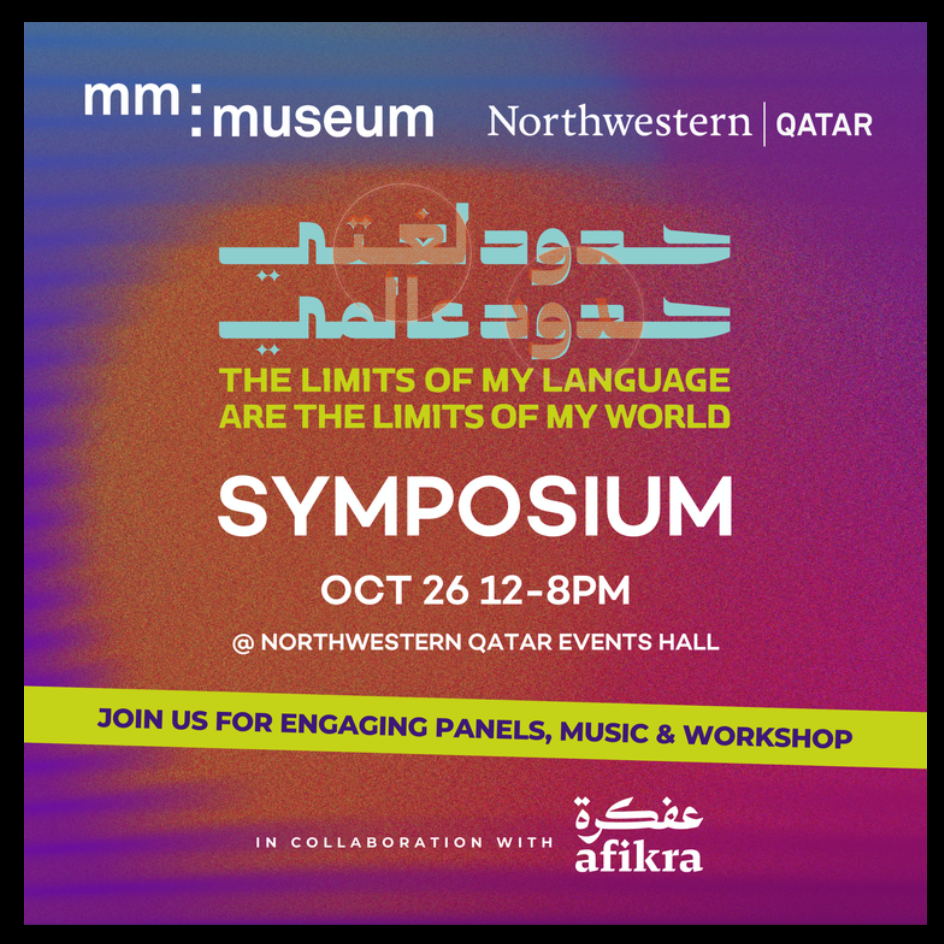Copyright | © CuratorWork / © CuratorView / © Alfredo Cramerotti [2024]
Art + Tech Director, Curator, Writer, Publisher
Office address: mm:museum [Media Majlis] @ Northwestern Qatar, Education City, Doha, Qatar
- CuratorWork / CuratorView is an artsphere website

Symposium "The limits of my language are the limits of my world", part of the Fall 2024 exhibition at Media Majlis Museum, in collaboration with afikra [institutional leadership]
Saturday 26 Oct 2024, 11:00 AM – 9:00 PM
The symposium titled "The limits of my language are the limits of my world" is part of the Fall 2024 exhibition at Media Majlis Museum, in collaboration with afikra. This event, held on October 26 at Northwestern Qatar Events Hall, featured a series of panels and activities exploring the role of the Arabic language through artificial intelligence, film, and media. Held at Northwestern Qatar’s Education City campus, the event drew a diverse, engaged audience who actively participated in discussions with experts and innovators, exploring the intersection of technology and storytelling in the Arab world. The program included several panel discussions featuring local and regional voices, each focusing on a unique theme, two performances, and various collateral activities.
Panel 1: Screens and Scripts: The Future of Arabic in Media
The first panel explored how the Arabic language is evolving across different media platforms, from traditional outlets to modern media and social media. The Lebanese director Amanda Abou Abdallah, award-winning filmmaker Rana Kazkaz, and producer Hussein Fakhri shared insights on how Arabic is being adapted to reach global audiences while maintaining its identity.
Rana Kazkaz said “The use of the Arabic language in media is not just a means of communication; it is a bridge to our cultural heritage and a vessel for knowledge production, innovation, creativity, and intellectual growth. Crucially, it ensures that our narratives have a part in shaping the global story."
Amanda Abou Abdallah said, “It’s not enough to create media that speaks in Arabic; we must think in Arabic and create from an Arab mindset to truly capture the essence of our culture, articulate our narratives, and preserve authenticity in our stories.”
Panel 2: Algorithms and Alphabets: Advancing Arabic in Technology
The second panel highlighted the intersection of Arabic and AI technologies, discussing the use of AI in the Arabic language. Nizar Habash from NYU Abu Dhabi and Salma Elkhaoudi, PhD in anthropology graduate from Stanford School of Humanities and Sciences, discussed the potential to transform how we interact with the Arabic language, while Houda Bouamor, associate teaching professor of information systems at Carnegie Mellon University in Qatar, provided insights with the challenges of developing culturally and linguistically sensitive AI systems.
Nizar Habash said, “The remarkable advancements in AI and NLP have the potential to shape a new writing and communication culture for the Arabic language in the 21st century. These technologies make it easier for native speakers, who primarily use dialects, to write and communicate in Standard Arabic. Additionally, they offer valuable support for non-Arabs who are interested in learning and using both Arabic and its various dialects.”
The full-day, multidisciplinary symposium aligned with the ongoing exhibition, "The limits of my language are the limits of my world," curated by Northwestern Qatar alumna Amal Zeyad Ali and it is part of a broader collaboration between mm:museum and afikra, which also includes a three-episode podcast series exploring Arabic language, culture, and identity. This series is jointly produced and published on The Afikra Podcast Network, furthering the conversation on these vital themes.
Panel 3: Arabic Publishing in Transition
The last panel explored the evolving landscape of Arabic publishing, this session brought together literary and academic experts such as Enam Al-Wer from the University of Essex and Layan Abdul Shakoor, founder and creative director at Saudi-based writing and publishing house Mauzoun, and the Lebanese author Omar Thawabeh. They explored the interaction between Classical Arabic and various dialects in contemporary literature.
Enam Al-Wer said, “This panel brings together publishers, linguists, and translators to explore innovative methods of collaboration to foster empirically informed publications that embrace the rich diversity of Arabic. Findings from academic research into the history and evolution of Arabic, along with its sociolinguistic dynamics in contemporary Arabic-speaking societies, provide the basis for a linguistic style that mirrors how Arabic is used, rather than how its native speakers should use it.”
mm:museum is the Arab world’s first media museum, dedicated to exploring, innovating, and celebrating media. Going beyond traditional museum roles, it promotes intellectual exploration, open dialogue, and innovation at the intersection of art, communication, and technology. Through a vibrant program of public initiatives, exhibitions, and workshops, mm:museum demonstrates its commitment to inclusivity and global perspectives, actively partnering with international institutions, artists, and technologists. Aimed at engaging young audiences, it provides a platform for experimentation and encourages discussions on contemporary issues from diverse perspectives.